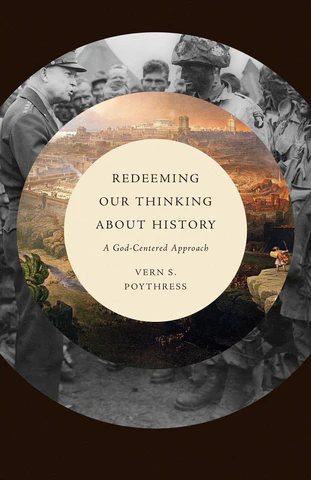
Vern S. Poythress
Reviewed by: David Graves
Redeeming Our Thinking about History: A God-Centered Approach, by Vern S. Poythress. Crossway, 2022. Paperback, 256 pages, $20.99 (Amazon). Reviewed by OP pastor David Graves.
Vern Poythress’s book Redeeming Our Thinking About History: A God-Centered Approach seeks to challenge readers to be more conscientious in their study of history. Poythress has divided the book into five parts. The first four will be profitable to anyone who reads or studies history, with the fifth part aimed at those with more scholarly historical pursuits, though it will prove profitable to the generalist as well.
The first section analyzes the various aspects of the study of history. He notes that there are three aspects that make up the studying and writing of history: events, people, and meanings. Section one details the difficulties and deficiencies of many attempts to write and study history that do not adequately engage these three aspects. Section two uses the three aspects of history developed in the first section and applies them to biblical history as revealed in the Scriptures of the Old and New Testaments. Section three moves past biblical history and begins to examine the historian’s limitations when he seeks to understand the events, people, and meanings outside of divine revelation. Section four takes the principles developed in the first three sections and applies them to concrete examples.
The fifth and final section addresses seven historiographical approaches that a Christian might take. The first five are developed from Jay D. Green’s writings. They are historical study: that takes religion seriously; through the lens of Christian faith commitments; as applied Christian ethics; as Christian apologetics; and as the search for God. The sixth is some form of providentialism, seeking to find God’s hand in history. The seventh, and the only one Poythress rejects outright, is going along with the flow of non-Christian historiography. He notes that the approach one takes ought to be considered a matter of Christian liberty, so long as it does not trespass God’s Word. Along this line, he notes that the biblical standard rules out hagiography, writing about Christian heroes of the faith as if they were without fault, as an approach to studying history.
Poythress returns several times to the question of providentialism. While one may quibble with some points, his cumulative argument on this is worth mentioning. He warns against reading those events in history that one deems propitious as God’s benevolent hand, while pronouncing others as God’s wrathful judgments. Such conclusions need to be reached circumspectly and with humility.
This book will serve the student of history well, helping them to think through their methodological considerations from an informed perspective. It will also serve the general Christian reader who desires to be more intentional in their approach to history.
November 30, 2025
November 23, 2025
November 16, 2025
November 09, 2025
November 02, 2025
October 26, 2025
October 19, 2025
© 2025 The Orthodox Presbyterian Church